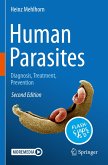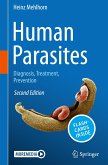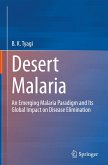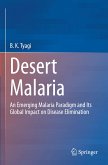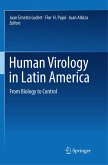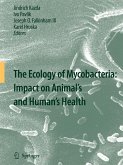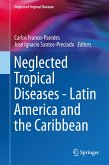- Gebundenes Buch
- Merkliste
- Auf die Merkliste
- Bewerten Bewerten
- Teilen
- Produkt teilen
- Produkterinnerung
- Produkterinnerung
This book provides up-to-date information on the characteristics of each species of intestinal fluke found in humans and on the management of infections caused by these trematodes. Biology, epidemiology, host-parasite relationships, pathogenicity, clinical aspects, diagnosis, and treatment are all reviewed in detail. The zoonotic intestinal flukes comprise 38 genera belonging to 16 families. They are morphologically diverse and each species has a characteristic life cycle and geographical distribution. Intestinal fluke infections are commonly considered as tropical endemic diseases in Asian…mehr
Andere Kunden interessierten sich auch für
![Human Parasites Human Parasites]() Heinz MehlhornHuman Parasites60,99 €
Heinz MehlhornHuman Parasites60,99 €![Human Parasites Human Parasites]() Heinz MehlhornHuman Parasites92,99 €
Heinz MehlhornHuman Parasites92,99 €![Desert Malaria Desert Malaria]() B.K. TyagiDesert Malaria112,99 €
B.K. TyagiDesert Malaria112,99 €![Desert Malaria Desert Malaria]() B.K. TyagiDesert Malaria112,99 €
B.K. TyagiDesert Malaria112,99 €![Human Virology in Latin America Human Virology in Latin America]() Human Virology in Latin America112,99 €
Human Virology in Latin America112,99 €![The Ecology of Mycobacteria: Impact on Animal's and Human's Health The Ecology of Mycobacteria: Impact on Animal's and Human's Health]() Jindrich KazdaThe Ecology of Mycobacteria: Impact on Animal's and Human's Health150,99 €
Jindrich KazdaThe Ecology of Mycobacteria: Impact on Animal's and Human's Health150,99 €![Neglected Tropical Diseases - Latin America and the Caribbean Neglected Tropical Diseases - Latin America and the Caribbean]() Neglected Tropical Diseases - Latin America and the Caribbean119,99 €
Neglected Tropical Diseases - Latin America and the Caribbean119,99 €-
-
-
This book provides up-to-date information on the characteristics of each species of intestinal fluke found in humans and on the management of infections caused by these trematodes. Biology, epidemiology, host-parasite relationships, pathogenicity, clinical aspects, diagnosis, and treatment are all reviewed in detail. The zoonotic intestinal flukes comprise 38 genera belonging to 16 families. They are morphologically diverse and each species has a characteristic life cycle and geographical distribution. Intestinal fluke infections are commonly considered as tropical endemic diseases in Asian countries, where 6 million people are infected, but the geographical limits and populations at risk are expanding and changing owing to a range of factors, including growing international markets, improved transportation systems, changes in eating habits, demographic trends, and climate change. While the pathogenicity of intestinal flukes is generally mild, the impact in immunocompromised individuals requires clarification and some diagnostic problems remain to be solved. In exploring all aspects of human intestinal fluke infections, this book will be invaluable for clinicians and researchers alike.
Produktdetails
- Produktdetails
- Verlag: Springer / Springer Netherlands / Springer, Berlin
- Artikelnr. des Verlages: 978-94-024-1702-9
- 1st edition 2019
- Seitenzahl: 564
- Erscheinungstermin: 4. September 2019
- Englisch
- Abmessung: 241mm x 160mm x 34mm
- Gewicht: 1049g
- ISBN-13: 9789402417029
- ISBN-10: 9402417028
- Artikelnr.: 55964886
- Herstellerkennzeichnung
- Springer-Verlag GmbH
- Tiergartenstr. 17
- 69121 Heidelberg
- ProductSafety@springernature.com
- Verlag: Springer / Springer Netherlands / Springer, Berlin
- Artikelnr. des Verlages: 978-94-024-1702-9
- 1st edition 2019
- Seitenzahl: 564
- Erscheinungstermin: 4. September 2019
- Englisch
- Abmessung: 241mm x 160mm x 34mm
- Gewicht: 1049g
- ISBN-13: 9789402417029
- ISBN-10: 9402417028
- Artikelnr.: 55964886
- Herstellerkennzeichnung
- Springer-Verlag GmbH
- Tiergartenstr. 17
- 69121 Heidelberg
- ProductSafety@springernature.com
Jong-Yil Chai is Emeritus Professor in the Department of Tropical Medicine and Parasitology, Seoul National University College of Medicine, Seoul, Korea. Professor Chai has been investigating diseases caused by intestinal parasites, including flukes, roundworms, and protozoans, for more than 40 years in the Republic of Korea. He has also worked in other Asian countries, including China, Thailand, Lao PDR, Cambodia, Vietnam, Myanmar, and Indonesia, as well as in Africa, especially Tanzania. He has published ten books and more than 560 original research papers on parasitology. Professor Chai has served as editor of the Korean Journal of Parasitology since 2006. He has been President of the World Federation of Parasitologists since 2018 and Treasurer of the International Federation for Tropical Medicine since 2012. In addition, he has served as President of the Korea Association of Health Promotion since January 2016.
Part I Heterophyids.- 1 Family Heterophyidae.- 2 Metagonimus.- 2.1 Metagonimus yokogawai.- 2.2 Metagonimus takahashii.- 2.3 Metagonimus miyatai.- 2.4 Metagonimus minutus.- 2.5 Metagonimus katsuradai.- 2.6 Potentially Zoonotic Metagonimus spp..- 2.7 Genomics and Proteomics.- 2.8 Pathology and Immunology.- 2.9 Clinical Manifestations, Diagnosis and Treatment.- 2.10 Prevention and Control.- 3 Heterophyes.- 3.1 Heterophyes heterophyes.- 3.2 Heterophyes nocens.- 3.3 Heterophyes dispar.- 3.4 Potentially Zoonotic Heterophyes spp..- 3.5 Genomics and Proteomics.- 3.6 Pathology and Immunology.- 3.7 Clinical Manifestations, Diagnosis and Treatment.- 3.8 Prevention and Control.- 4 Haplorchis.- 4.1 Haplorchis taichui.- 4.2 Haplorchis pumilio.- 4.2 Haplorchis yokogawai.- 4.4 Haplorchis vanissimus.- 4.5 Potentially Zoonotic Haplorchis spp..- 4.6 Genomics and Proteomics.- 4.7 Pathology and Immunology.- 4.8 Clinical Manifestations, Diagnosis and Treatment.- 4.9 Prevention and Control.- 5 Acanthotrema.- 5.1 Acanthotrema felis.- 6 Apophallus.- 6.1 Apophallus donicus.- 7 Ascocotyle longa.- 7.1 Ascocotyle longa.- 8 Centrocestus.- 8.1 Centrocestus armatus.- 8.2 Centrocestus cuspidatus.- 8.3 Centrocestus formosanus.- 8.4 Centrocestus kurokawai.- 9 Cryptocotyle.- 9.1 Cryptocotyle lingua.- 10 Heterophyopsis.- 10.1 Heterophyopsis continua.- 11 Procerovum.- 11.1 Procerovum calderoni.- 11.2 Procerovum varium.- 12 Pygidiopsis.- 12.1 Pygidiopsis genata.- 12.2 Pygidiopsis summa.- 13 Stellantchasmus.- 13.1 Stellantchasmus falcatus.- 14 Stictodora.- 14.1 Stictodora fuscata.- 14.2 Stictodora lari.- Part 2 Echinostomes.- 1 Family Echinostomatidae.- 2 Echinostoma.- 2.1 Echinostoma revolutum.- 2.2 Echinostoma cinetorchis.- 2.3 Echinostoma lindoense.- 2.4 Echinostoma paraensei.- 2.5 Echinostoma ilocanum.- 2.6 Echinostoma macrorchis.- 2.7 Echinostoma angustitestis.- 2.8 Echinostoma aegyptiacum.- 2.9 Potentially Zoonotic Echinostoma spp..- 2.10 Genomics and Proteomics.- 2.11 Pathology and Immunology.- 2.12 Clinical Manifestations, Diagnosis and Treatment.- 2.13 Prevention and Control.- 3 Isthmiophora.- 3.1 Isthmiophora hortensis.- 3.2 Isthmiophora melis.- 3.3 Potentially Zoonotic Isthmiophora spp..- 3.4 Genomics and Proteomics.- 3.5 Pathology and Immunology.- 3.6 Clinical Manifestations, Diagnosis and Treatment.- 3.7 Prevention and Control.- 4 Echinochasmus.- 4.1 Echinochasmus japonicus.- 4.2 Echinochasmus perfoliatus.- 4.3 Echinochasmus liliputanus.- 4.4 Echinochasmus fujianensis.- 4.5 Echinochasmus jiufoensis.- 4.6 Echinochasmus caninus.- 4.7 Potentially Zoonotic Echinochasmus spp..- 4.8 Genomics and Proteomics.- 4.9 Pathology and Immunology.- 4.10 Clinical Manifestations, Diagnosis and Treatment.- 4.11 Prevention and Control.- 5 Acanthoparyphium.- 5.1 Acanthoparyphium tyosenense.- 6 Artyfechinostomum.- 6.1 Artyfechinostomum malayanum.- 6.2 Artyfechinostomum sufrartyfex.- 6.3 Artyfechinostomum oraoni.- 7 Echinoparyphium.- 7.1 Echinoparyphium recrvatum.- 8 Himasthla.- 8.1 Himasthla muehlensi.- 9 Hypoderaeum.- 9.1 Hypoderaeum conoideum.- Part 3 Amphistomes.- 1 Families Gastrothylacidae and Gastrodiscidae.- 2 Fischoederius, Gastrodiscoides, and Watsonius.- 2.1 Fischoederius elongatus.- 2.2 Gastrodiscoides hominis.- 2.3 Watsonius watsoni.- 2.4 Potentially Zoonotic amphistome spp..- 2.5 Genomics and Proteomics.- 2.6 Pathology and Immunology.- 2.7 Clinical Manifestations, Diagnosis and Treatment.- 2.8 Prevention and Control.- Part 4 Diplostomes.- 1 Family Diplostomidae.- 2 Neodiplostomum and Fibricola.- 2.1 Neodiplostomum seoulense.- 2.2 Fibricola cratera.- 2.3 Potentially Zoonotic Neodiplostomum and Fibricola spp..- 2.4 Genomics and Proteomics.- 2.5 Pathology and Immunology.- 2.6 Clinical Manifestations, Diagnosis and Treatment.- 2.7 Prevention and Control.- Part 5 Fasciolids.- 1 Family Fasciolidae.- 2 Fasciolopsis.- 2.1 Fasciolopsis buski.- 2.2 Potentially Zoonotic Fasciolopsis spp..- 2.3 Genomics and Proteomics.- 2.4 Pathology and Immunology.- 2.5 Clinical Manifestations, Diagnosis and Treatment.- 2.6 Prevention and Control.- Part 6 Gymnophallids.- 1 Family Gymnophallidae.- 2 Gymnophalloides.- 2.1 Gymnophalloides seoi.- 2.2 Potentially Zoonotic Gymnophalloides spp..- 2.3 Genomics and Proteomics.- 2.4 Pathology and Immunology.- 2.5 Clinical Manifestations, Diagnosis and Treatment.- 2.6 Prevention and Control.- Part 7 Lecithodendriid-Like Flukes.- 1 Families Lecithodendriidae and Phaneropsolidae.- 2 Caprimolgorchis and Phaneropsolus.- 2.1 Caprimolgorchis molenkampi.- 2.2 Phaneropsolus bonnei.- 2.3 Phaneropsolus spinicirrus.- 2.4 Potentially Zoonotic Caprimolgorchis and Phaneropsolus spp..- 2.5 Genomics and Proteomics.- 2.6 Pathology and Immunology.- 2.7 Clinical Manifestations, Diagnosis and Treatment.- 2.8 Prevention and Control.- Part 8 Plagiorchiids.- 1 Family Plagiorchiidae.- 2 Plagiorchis.- 2.1 Plagiorchis muris.- 2.2 Plagiorchis javensis.- 2.3 Plagiorchis philippinensis.- 2.4 Plagiorchis harinasutai.- 2.5 Plagiorchis vespertilionis.- 2.6 Potentially Zoonotic Plagiorchis spp..- 2.7 Genomics and Proteomics.- 2.8 Pathology and Immunology.- 2.9 Clinical Manifestations, Diagnosis and Treatment.- 2.10 Prevention and Control.- Part 9 Miscellaneous Species.- 1 Species Involved.- 1.1 Brachylaima cribbi (Brachylaimidae).- 1.2 Cotylurus japonicus (Strigeidae).- 1.3 Gynaecotyla squatarolae (Microphallidae).- 1.4 Isoparorchis hypselobagri (Isoparorchiidae).- 1.5 Microphallus brevicaeca (Microphallidae).- 1.6 Nanophyetus salmincola and Nanophyetus schikhobalowi (Troglotrematidae).- 1.7 Prohemistomum vivax (Cyathocotylidae).- Index.
Part I Heterophyids.- 1 Family Heterophyidae.- 2 Metagonimus.- 2.1 Metagonimus yokogawai.- 2.2 Metagonimus takahashii.- 2.3 Metagonimus miyatai.- 2.4 Metagonimus minutus.- 2.5 Metagonimus katsuradai.- 2.6 Potentially Zoonotic Metagonimus spp..- 2.7 Genomics and Proteomics.- 2.8 Pathology and Immunology.- 2.9 Clinical Manifestations, Diagnosis and Treatment.- 2.10 Prevention and Control.- 3 Heterophyes.- 3.1 Heterophyes heterophyes.- 3.2 Heterophyes nocens.- 3.3 Heterophyes dispar.- 3.4 Potentially Zoonotic Heterophyes spp..- 3.5 Genomics and Proteomics.- 3.6 Pathology and Immunology.- 3.7 Clinical Manifestations, Diagnosis and Treatment.- 3.8 Prevention and Control.- 4 Haplorchis.- 4.1 Haplorchis taichui.- 4.2 Haplorchis pumilio.- 4.2 Haplorchis yokogawai.- 4.4 Haplorchis vanissimus.- 4.5 Potentially Zoonotic Haplorchis spp..- 4.6 Genomics and Proteomics.- 4.7 Pathology and Immunology.- 4.8 Clinical Manifestations, Diagnosis and Treatment.- 4.9 Prevention and Control.- 5 Acanthotrema.- 5.1 Acanthotrema felis.- 6 Apophallus.- 6.1 Apophallus donicus.- 7 Ascocotyle longa.- 7.1 Ascocotyle longa.- 8 Centrocestus.- 8.1 Centrocestus armatus.- 8.2 Centrocestus cuspidatus.- 8.3 Centrocestus formosanus.- 8.4 Centrocestus kurokawai.- 9 Cryptocotyle.- 9.1 Cryptocotyle lingua.- 10 Heterophyopsis.- 10.1 Heterophyopsis continua.- 11 Procerovum.- 11.1 Procerovum calderoni.- 11.2 Procerovum varium.- 12 Pygidiopsis.- 12.1 Pygidiopsis genata.- 12.2 Pygidiopsis summa.- 13 Stellantchasmus.- 13.1 Stellantchasmus falcatus.- 14 Stictodora.- 14.1 Stictodora fuscata.- 14.2 Stictodora lari.- Part 2 Echinostomes.- 1 Family Echinostomatidae.- 2 Echinostoma.- 2.1 Echinostoma revolutum.- 2.2 Echinostoma cinetorchis.- 2.3 Echinostoma lindoense.- 2.4 Echinostoma paraensei.- 2.5 Echinostoma ilocanum.- 2.6 Echinostoma macrorchis.- 2.7 Echinostoma angustitestis.- 2.8 Echinostoma aegyptiacum.- 2.9 Potentially Zoonotic Echinostoma spp..- 2.10 Genomics and Proteomics.- 2.11 Pathology and Immunology.- 2.12 Clinical Manifestations, Diagnosis and Treatment.- 2.13 Prevention and Control.- 3 Isthmiophora.- 3.1 Isthmiophora hortensis.- 3.2 Isthmiophora melis.- 3.3 Potentially Zoonotic Isthmiophora spp..- 3.4 Genomics and Proteomics.- 3.5 Pathology and Immunology.- 3.6 Clinical Manifestations, Diagnosis and Treatment.- 3.7 Prevention and Control.- 4 Echinochasmus.- 4.1 Echinochasmus japonicus.- 4.2 Echinochasmus perfoliatus.- 4.3 Echinochasmus liliputanus.- 4.4 Echinochasmus fujianensis.- 4.5 Echinochasmus jiufoensis.- 4.6 Echinochasmus caninus.- 4.7 Potentially Zoonotic Echinochasmus spp..- 4.8 Genomics and Proteomics.- 4.9 Pathology and Immunology.- 4.10 Clinical Manifestations, Diagnosis and Treatment.- 4.11 Prevention and Control.- 5 Acanthoparyphium.- 5.1 Acanthoparyphium tyosenense.- 6 Artyfechinostomum.- 6.1 Artyfechinostomum malayanum.- 6.2 Artyfechinostomum sufrartyfex.- 6.3 Artyfechinostomum oraoni.- 7 Echinoparyphium.- 7.1 Echinoparyphium recrvatum.- 8 Himasthla.- 8.1 Himasthla muehlensi.- 9 Hypoderaeum.- 9.1 Hypoderaeum conoideum.- Part 3 Amphistomes.- 1 Families Gastrothylacidae and Gastrodiscidae.- 2 Fischoederius, Gastrodiscoides, and Watsonius.- 2.1 Fischoederius elongatus.- 2.2 Gastrodiscoides hominis.- 2.3 Watsonius watsoni.- 2.4 Potentially Zoonotic amphistome spp..- 2.5 Genomics and Proteomics.- 2.6 Pathology and Immunology.- 2.7 Clinical Manifestations, Diagnosis and Treatment.- 2.8 Prevention and Control.- Part 4 Diplostomes.- 1 Family Diplostomidae.- 2 Neodiplostomum and Fibricola.- 2.1 Neodiplostomum seoulense.- 2.2 Fibricola cratera.- 2.3 Potentially Zoonotic Neodiplostomum and Fibricola spp..- 2.4 Genomics and Proteomics.- 2.5 Pathology and Immunology.- 2.6 Clinical Manifestations, Diagnosis and Treatment.- 2.7 Prevention and Control.- Part 5 Fasciolids.- 1 Family Fasciolidae.- 2 Fasciolopsis.- 2.1 Fasciolopsis buski.- 2.2 Potentially Zoonotic Fasciolopsis spp..- 2.3 Genomics and Proteomics.- 2.4 Pathology and Immunology.- 2.5 Clinical Manifestations, Diagnosis and Treatment.- 2.6 Prevention and Control.- Part 6 Gymnophallids.- 1 Family Gymnophallidae.- 2 Gymnophalloides.- 2.1 Gymnophalloides seoi.- 2.2 Potentially Zoonotic Gymnophalloides spp..- 2.3 Genomics and Proteomics.- 2.4 Pathology and Immunology.- 2.5 Clinical Manifestations, Diagnosis and Treatment.- 2.6 Prevention and Control.- Part 7 Lecithodendriid-Like Flukes.- 1 Families Lecithodendriidae and Phaneropsolidae.- 2 Caprimolgorchis and Phaneropsolus.- 2.1 Caprimolgorchis molenkampi.- 2.2 Phaneropsolus bonnei.- 2.3 Phaneropsolus spinicirrus.- 2.4 Potentially Zoonotic Caprimolgorchis and Phaneropsolus spp..- 2.5 Genomics and Proteomics.- 2.6 Pathology and Immunology.- 2.7 Clinical Manifestations, Diagnosis and Treatment.- 2.8 Prevention and Control.- Part 8 Plagiorchiids.- 1 Family Plagiorchiidae.- 2 Plagiorchis.- 2.1 Plagiorchis muris.- 2.2 Plagiorchis javensis.- 2.3 Plagiorchis philippinensis.- 2.4 Plagiorchis harinasutai.- 2.5 Plagiorchis vespertilionis.- 2.6 Potentially Zoonotic Plagiorchis spp..- 2.7 Genomics and Proteomics.- 2.8 Pathology and Immunology.- 2.9 Clinical Manifestations, Diagnosis and Treatment.- 2.10 Prevention and Control.- Part 9 Miscellaneous Species.- 1 Species Involved.- 1.1 Brachylaima cribbi (Brachylaimidae).- 1.2 Cotylurus japonicus (Strigeidae).- 1.3 Gynaecotyla squatarolae (Microphallidae).- 1.4 Isoparorchis hypselobagri (Isoparorchiidae).- 1.5 Microphallus brevicaeca (Microphallidae).- 1.6 Nanophyetus salmincola and Nanophyetus schikhobalowi (Troglotrematidae).- 1.7 Prohemistomum vivax (Cyathocotylidae).- Index.


